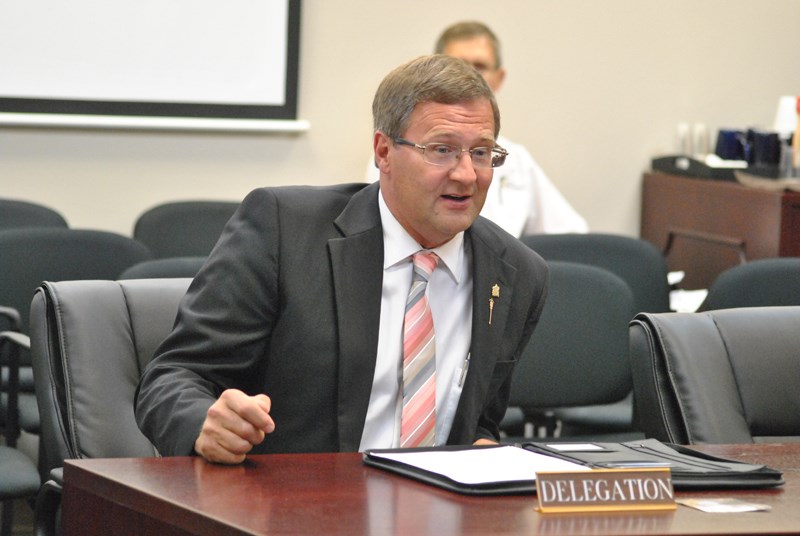The UCP have taken another step against what they say is federal overreach with the first reading of Bill 18, the Provincial Priorities Act (PPA), passing through the legislature on April 10.
Under the act, the province would be able to veto future deals between “provincial entities” including municipalities, school boards, housing divisions, and universities, and the federal government.
“The bill has been introduced to ensure that Ottawa and the federal government is consulting with the provincial government on all aspects of organizations that are provincial entities,” said Athabasca-Barrhead-Westlock MLA Glenn van Dijken. “I believe that’s the respectful thing to do, I believe it’s the right thing to do.”
Alberta isn’t the first province to introduce such a bill; Quebec has a similar bill prohibiting federal-municipal agreements without authorization, although the PPA is more encompassing.
Local politicians said they were cautiously optimistic about the announcement, which some believe will see funding spread more evenly across the province.
“I believe that there is some overreach there. I think it’s on purpose, and I think it’s political,” said Village of Boyle Mayor Colin Derko. “I think it’s a sign of disrespect and disregard for Albertans as a whole.”
Derko said there are concerns around access to federal dollars — the PPA would limit the ability for municipalities to access funds from the government for projects that run counter to provincial priorities.
“If it does, in fact, hinder us from actually getting federal funding, then I take issue with it,” said Derko. “If it means the province wants to be aware of it in order to make sure it goes towards a provincial plan, okay.”
Provincially, Alberta Municipalities (ABmunis) president Tyler Gandam said federal funding was important for municipalities, who have received less and less provincial funding, particularly around infrastructure. According to ABmunis, in 2011 municipalities received about $420 per resident in infrastructure funding but that number has fallen to roughly $186 today.
Athabasca County Reeve Brian Hall said municipalities have also seen an increase in “downloading,” where the province passes costs down to communities.
“We’ve got a double whammy where, yes, the dollar amount is going down, and populations are going up as well,” said Hall. “We’ve seen the transfer of tremendous amounts of costs in policing to municipalities, the cancellation of the Well Drilling Equipment tax, the tax holiday on some pipelines and installations and more.”
Other municipal officials, including Town of Westlock Mayor Jon Kramer, said they were waiting to hear more before they weighed in. Representatives from the County of Barrhead, Westlock County, and the Town of Athabasca were unable to be reached before print.
'Expected outcome' says province
Municipalities aren’t the only impacted entities — van Dijken said there is the potential for Athabasca University to have federal agreements in place, although he was unsure, and school boards are also on the list of provincial entities covered by the act.
Aspen View School Division and Pembina Hills School Division both indicated that there aren’t any federal agreements in place that would be impacted, although the recent federal proposal for a national lunch program for students was one example listed by van Dijken as federal overreach.
“It becomes very hard for a government to properly manage the affairs of the province when contracts are being entered into without the awareness of the provincial government,” he said. “It’s become evident that the federal government is moving into provincial jurisdiction in areas that are already being addressed by provincial priority programs.”
Greater North Foundation’s board chair Pat Ferguson said while the foundation was a provincial entity, all the funding it had received had already come from the province and as such he wasn’t anticipating an adverse impact.
“We appreciate any money that comes in from the government, but the jurisdiction is all provincial,” he said.
In an April 10 press event, Premier Danielle Smith and Minister of Municipal Affairs Rick McIver answered questions about what the act would and would not apply to, and how existing agreements would be handled.
Smith said out of the 14,000 federal agreements reviewed, 800 were flagged as problematic: electric buses, wind and solar projects, net-zero housing and electricity, safe supply programs, pharmacare, and dental care were listed as programs that don’t align with Alberta’s priorities.
Smith said moving forward, all federal agreements with Alberta entities will go through the provincial government to make sure there are no “ideological strings” attached and the funds will then be disbursed to towns, cities, and other entities.
The act isn’t retroactive, according to McIver, although existing federal-municipal agreements that have “terms that can’t be lived with,” such as requiring homes to be built without natural gas hookups, may come under review.
“This is the sort of process you go through from a government point of view. I believe we’ve given very clear indication to all of the municipalities of the direction we were heading,” said Smith.
-With files from Brett McKay



